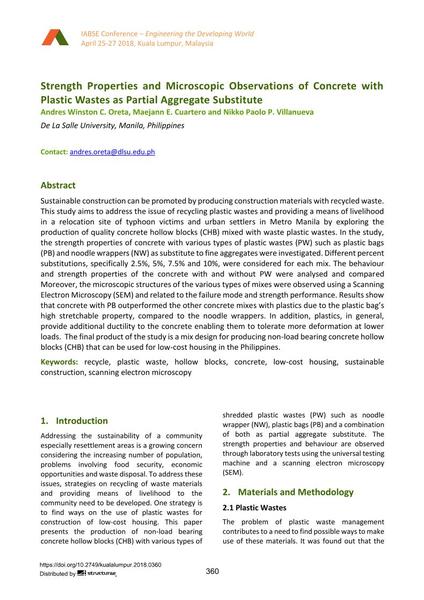Strength Properties and Microscopic Observations of Concrete with Plastic Wastes as Partial Aggregate Substitute

|
|
|||||||||||
Bibliographic Details
| Author(s): |
Andres Winston C. Oreta
(De La Salle University, Manila, Philippines)
Maejann E. Cuartero (De La Salle University, Manila, Philippines) Nikko Paolo P. Villanueva (De La Salle University, Manila, Philippines) |
||||
|---|---|---|---|---|---|
| Medium: | conference paper | ||||
| Language(s): | English | ||||
| Conference: | IABSE Conference: Engineering the Developing World, Kuala Lumpur, Malaysia, 25-27 April 2018 | ||||
| Published in: | IABSE Conference Kuala Lumpur 2018 | ||||
|
|||||
| Page(s): | 360-367 | ||||
| Total no. of pages: | 8 | ||||
| DOI: | 10.2749/kualalumpur.2018.0360 | ||||
| Abstract: |
Sustainable construction can be promoted by producing construction materials with recycled waste. This study aims to address the issue of recycling plastic wastes and providing a means of livelihood in a relocation site of typhoon victims and urban settlers in Metro Manila by exploring the production of quality concrete hollow blocks (CHB) mixed with waste plastic wastes. In the study, the strength properties of concrete with various types of plastic wastes (PW) such as plastic bags (PB) and noodle wrappers (NW) as substitute to fine aggregates were investigated. Different percent substitutions, specifically 2.5%, 5%, 7.5% and 10%, were considered for each mix. The behaviour and strength properties of the concrete with and without PW were analysed and compared Moreover, the microscopic structures of the various types of mixes were observed using a Scanning Electron Microscopy (SEM) and related to the failure mode and strength performance. Results show that concrete with PB outperformed the other concrete mixes with plastics due to the plastic bag’s high stretchable property, compared to the noodle wrappers. In addition, plastics, in general, provide additional ductility to the concrete enabling them to tolerate more deformation at lower loads. The final product of the study is a mix design for producing non-load bearing concrete hollow blocks (CHB) that can be used for low-cost housing in the Philippines. |
||||
| Keywords: |
concrete sustainable construction scanning electron microscopy plastic waste low-cost housing recycle hollow blocks
|
||||
